|
A Virtual Walk Through Jacksonville History
Stop 38: Plymale Cottage
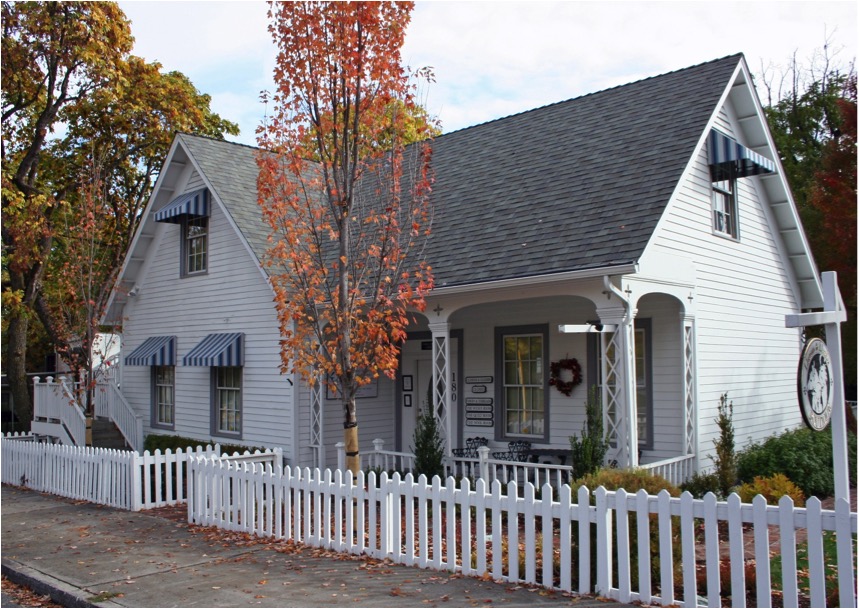 Plymale Cottage, 2010 – Photo courtesy of Carolyn Kingsnorth Plymale Cottage, 2010 – Photo courtesy of Carolyn Kingsnorth
Although our next stop at 180 North Oregon Street in Jacksonville may be known as the Plymale Cottage, the Plymale family were actually latecomers to this site. Their home was originally across Oregon Street where the Visitors Center—formerly the Rogue River Valley Railroad Station—is now located. They moved to this house after the 1888 fire that began in David Linn’s furniture factory engulfed their earlier home. They barely escaped with the clothes on their backs. Linn provided this house as a place for them to live and then sold it to William Plymale in 1890.
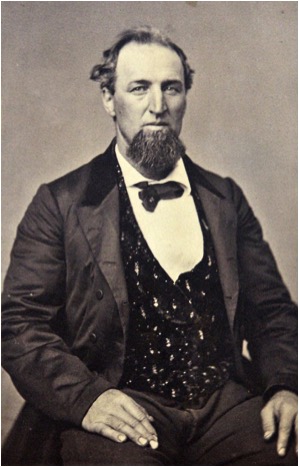 David Linn. SOHS # 10365. David Linn. SOHS # 10365. |
David Linn had arrived in Jacksonville by 1852. He was a carpenter by trade. Rather than mining, he supplied early residents with furniture and then became the foremost contractor for the town’s wood frame buildings. By 1860 Linn owned this lot. His “furniture store” and planning mill owned the lot at the northeast corner of Oregon and California streets, and county deeds indicate his “lumber yard, shed, and ware-room” were located on this site.
Even though The Jackson Reveille Weekly reported in 1868 that local saloon keeper, Henry Breitbarth, was “building an elegant residence on the corner of C and Oregon streets,” Linn is probably the one who constructed this 1 ½ story Classical Revival-style dwelling, replacing a simple wooden building he had erected some 12 years earlier. Breitbarth may have been renting the “elegant residence,” but he did not purchase the property until 1871.
|
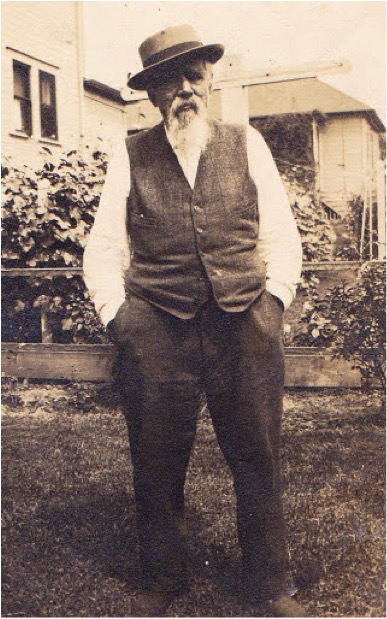 Henry Breitbarth. Henry Breitbarth.
Photo Source:findagrave.com.
|
A native of Prussia, Heinrich “Henry” Breitbarth immigrated to America in 1850 when he was about 18 and soon after crossed the plains to California. Initially settling in Yreka, he subsequently moved to Jacksonville after helping to build the first engineered wagon road to cross the Siskiyou Mountains. From 1864 to 1871, Breitbarth was the owner of the original Bella Union Saloon.
In 1873 the Breitbarth family moved to Portland and ownership of this “dwelling house” reverted to Linn. Linn seems to have subsequently used it as a rental. In June 1884, the Democratic Times noted that “D. Linn is fixing up his property on the corner of Oregon and C Streets in good shape. It will be occupied by Joe Solomon and his wife.”
The house itself almost burned in the 1888 fire that destroyed Linn’s factory and planning mill. The Democratic Times reported, “The unoccupied dwelling house belonging to D. Linn in the rear of Fisher’s store was on fire several times from flying cinders.” With their home burned to the ground, the Plymale family was undoubtedly pleased to simply have housing!
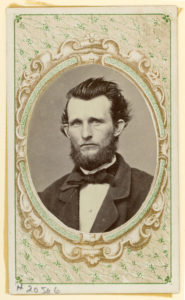 William Plymale. William Plymale.
Photo Source: SOHS #26898. |
William and Josephine Plymale and their children had been living on the family farm in what is now Medford until 1875. William concentrated on livestock; Josephine was the “orchardist.” That year they moved into Jacksonville, taking over the Excelsior Livery Stable, previously owned by William’s older brother, Sebastian. The Livery Stable was kitty-cornered across the street from the “Plymale Cottage” and across C Street from their initial home. They ran the Livery Stable for the next 15 years. Both served as “drivers.”
And both were extremely active politically. William was a member of the Oregon State Legislature. He was also Jackson County Surveyor, Deputy County Clerk, and a Justice of the Peace.
Josephine’s views did not necessarily align with his.
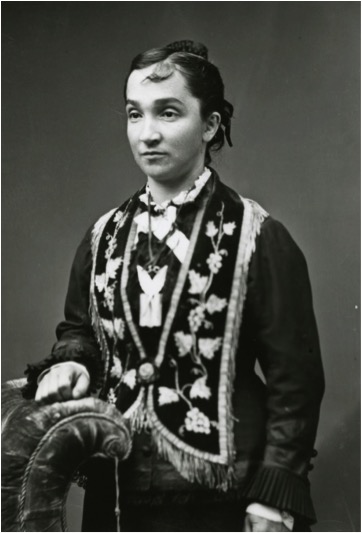 Josephine Martin Plymale Josephine Martin Plymale
Photo Source: Ancestry.com |
Josephine had been raised on farms and was a faithful member of the Grange and the Jackson County Agricultural Society. She remained a lifelong advocate of farmers and agriculture and was popular and frequent speaker at Grange events.
She was a gifted writer. She was the Jacksonville correspondent for both the Ashland Daily Tidings and the Oregonian, and she was a Vice President of the Oregon Press Association.
She was one of the most active members of the Women’s Suffrage movement and at age 30, was elected Vice President of the Oregon Association. She was also involved with the Temperance movement.
In 1892 Josephine officially filed for the position of Jackson County Recorder. However, her name never appeared on the ballot. A newspaper article responded to her candidacy with the following comment: “If you never ask for an office you will never be refused one.”
One year later, she obtained the position of committee clerk for the legislative assembly of the Oregon State Legislature and two years later was again employed as clerk for the senate chamber. Josephine took her two youngest daughters with her to Salem to give them a taste of politics and to learn how laws were made. She also served as the interim Jacksonville Town Clerk when the regular clerk was absent.
Josephine never did realize her political ambitions or the right to vote. She died in 1899 at the age of 54 after “weeks and months of the most intense suffering” from an unnamed illness. William died some five years later. Both are buried in the Plymale family plot in the City section of the Jacksonville Cemetery.
The cottage was originally classified as a primary contributing structure in Jacksonville’s National Historic Landmark District. However, due to alterations made within the last 20 years, the State no longer considers it “contributing.” Its status vis a vis the Historic District is unknown.
Sources Cited:
Ancestry.com
Evans, Gail E.H. State of Oregon Inventory of Historic Properties, “Henry Breitbarth House,” January, 1980.
Kingsnorth, Carolyn. Jacksonville Review, “Josephine Martin Plymale – Pioneer Feminist and Suffragette,” October 2016.
|